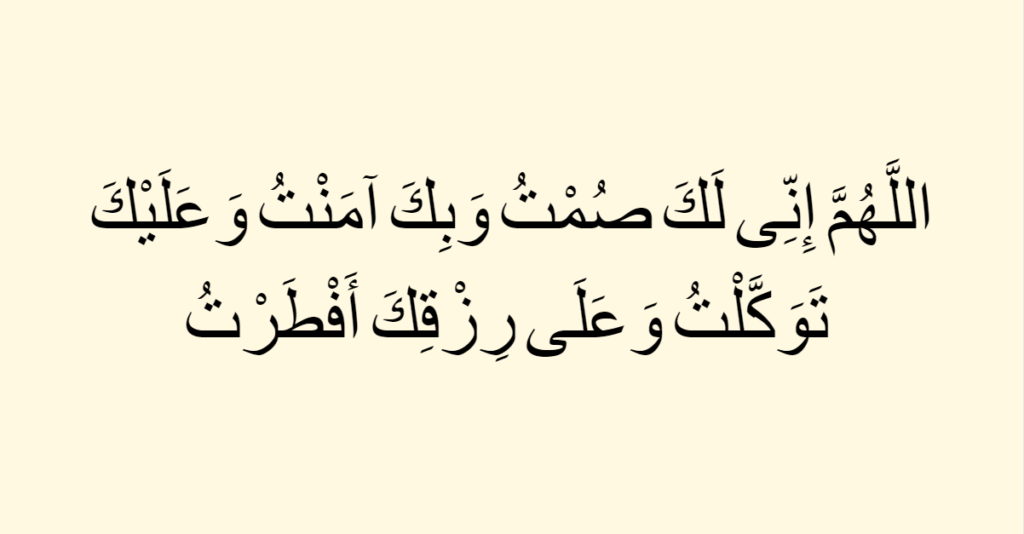Introduction
As the crescent moon graces the sky, Muslims around the world eagerly await the moment of breaking their fast during the holy month of Ramadan. This sacred act, known as Iftar, holds profound spiritual significance in Islam. It is not merely a physical nourishment but a spiritual rejuvenation—a moment of communion with the Divine. Central to this ritual is the recitation of Iftar Dua, a supplication uttered as one breaks their fast. In this comprehensive guide, we delve into the essence of Iftar, explore its spiritual dimensions, and uncover the profound meaning behind Iftar Dua.

Iftar Dua
اللَّهُمَّ إِنِّی لَكَ صُمْتُ وَبِكَ آمَنْتُ وَعَلَيْكَ تَوَكَّلْتُ وَعَلَى رِزْقِكَ أَفْطَرْتُ
Transliteration:
“Allahumma Inni Laka Sumtu Wa-Bika Aamantu Wa’Alaika Tawakkaltu Wa’Alaa Rizqika Aftartu.”
Translation in English:
“O Allah! Indeed, I observe fast for you, and believed in you and have trust only in you and broke fast with your given food.”
What is Iftar?
Iftar, derived from the Arabic word “Futoor,” translates to breakfast. However, in the context of Ramadan, it signifies the evening meal with which Muslims break their fast at sunset. It marks the end of a day-long abstention from food, drink, and worldly desires, and the beginning of a period of nourishment and reflection.
The Spiritual Essence of Iftar: Insights from Hadiths
The significance of Iftar transcends mere sustenance; it is a moment filled with blessings and spiritual rewards. Prophet Muhammad (Peace Be Upon Him) emphasized the profound rewards associated with breaking the fast. In a Hadith narrated by Abu Huraira (R.A), the Prophet (P.B.U.H) elucidated, “There are two pleasures for the fasting person, one at the time of breaking his fast, and the other at the time when he will meet his Lord; then he will be pleased because of his fasting.” (Sahih Bukhari, Vol. 3, Book 31, Hadith 128)
Furthermore, the Prophet (P.B.U.H) highlighted the divine redemption bestowed upon those who observe Iftar. He said, “At every breaking of the fast, Allaah has people whom He redeems.” (Ahmad)
The Virtue of Hastening in Iftar
In the rush of modern life, hastening in Iftar might seem counterintuitive. However, Prophet Muhammad (P.B.U.H) encouraged believers to hasten in breaking their fast, as it symbolizes adherence to the Sunnah and distinguishes Muslims from other communities. He prophesied, “This Deen will be predominant until people hasten in breaking their fasts because of Jew and Christians’ delay in breaking fast” (Sunan Ibn Dawood, Volume 2, Hadith no. 2353).
Selecting the Ideal Meal for Iftar
Salman ibn ‘Amir reported: The Messenger of Allah (P.B.U.H) said, “When one of you breaks his fast, let him break it with dates for they are blessed. If they are not found, let him break it with water for it is pure.” (Sunan al-Tirmidhi 695)
The Reverence of Iftar Dua
Central to the ritual of Iftar is the recitation of a supplication known as Iftar Dua. This heartfelt prayer symbolizes gratitude, reliance on Allah, and acknowledgment of His blessings. The widely recited Iftar Dua is:
Conclusion: Embracing the Spirituality of Iftar
In conclusion, Iftar transcends the mere act of breaking one’s fast; it is a spiritual journey infused with divine blessings and rewards. From the hastening of Iftar to the selection of the ideal meal and the reverential recitation of Iftar Dua, every aspect of this ritual is imbued with profound significance. As Muslims gather with their loved ones to partake in this sacred tradition, let us remember the spiritual essence of Iftar and strive to deepen our connection with the Divine. May our supplications be sincere, our hearts be grateful, and our souls be enriched during this blessed month of Ramadan.
References
- Sahih Bukhari, Vol. 3, Book 31, Hadith 128
- Sunan Ibn Dawood, Volume 2, Hadith no. 2353
- Sunan al-Tirmidhi 695
Frequently Asked Questions (FAQs) about Iftar and Iftar Dua
Q1: What is the significance of Iftar in Islam?
A1: Iftar holds immense significance in Islam as it marks the breaking of the fast during the holy month of Ramadan. It is not only a moment of physical nourishment but also a time for spiritual rejuvenation and reflection.
Q2: Why is hastening in Iftar encouraged?
A2: Hastening in Iftar is encouraged in Islam as it follows the Sunnah of Prophet Muhammad (P.B.U.H) and distinguishes Muslims from other communities. It symbolizes adherence to tradition and exemplifies the urgency in fulfilling one’s religious obligations.
Q3: What is the recommended meal for breaking the fast?
A3: The Prophet Muhammad (P.B.U.H) recommended breaking the fast with dates due to their blessed nature. If dates are not available, breaking the fast with water is advised as it is pure and cleansing.
Q4: What is Iftar Dua, and why is it recited?
A4: Iftar Dua is a supplication recited by Muslims at the time of breaking their fast. It serves as a moment of gratitude, acknowledging Allah’s blessings and seeking His guidance and mercy.
Q5: Can Iftar Dua be recited in any language?
A5: Yes, Iftar Dua can be recited in any language, but the original Arabic version holds special significance. However, translations are available to ensure that all Muslims can understand and recite it with sincerity.
Q6: Is there a specific time for reciting Iftar Dua?
A6: There is no specific time for reciting Iftar Dua, but it is traditionally recited immediately before breaking the fast. This allows for a moment of reflection and gratitude before partaking in the evening meal.
Q7: Can Iftar Dua be personalized?
A7: While the traditional Iftar Dua is widely recited, Muslims can also personalize their supplications, expressing their gratitude, desires, and aspirations in their own words.
Q8: Is there any significance to reciting Iftar Dua in congregation?
A8: Reciting Iftar Dua in congregation fosters a sense of unity and spirituality among Muslims. It strengthens communal bonds and enhances the collective experience of breaking the fast.
Q9: How can one ensure that their Iftar Dua is sincere and heartfelt?
A9: Sincerity is paramount when reciting Iftar Dua. Muslims should approach it with humility, sincerity, and devotion, reflecting on their gratitude for Allah’s blessings and seeking His mercy and guidance.
Q10: Can non-Muslims participate in Iftar and recite Iftar Dua?
A10: While Iftar is primarily observed by Muslims, non-Muslims are welcome to join in the communal gatherings and partake in the spirit of unity and compassion. However, the recitation of Iftar Dua is a religious practice specific to Islam.

